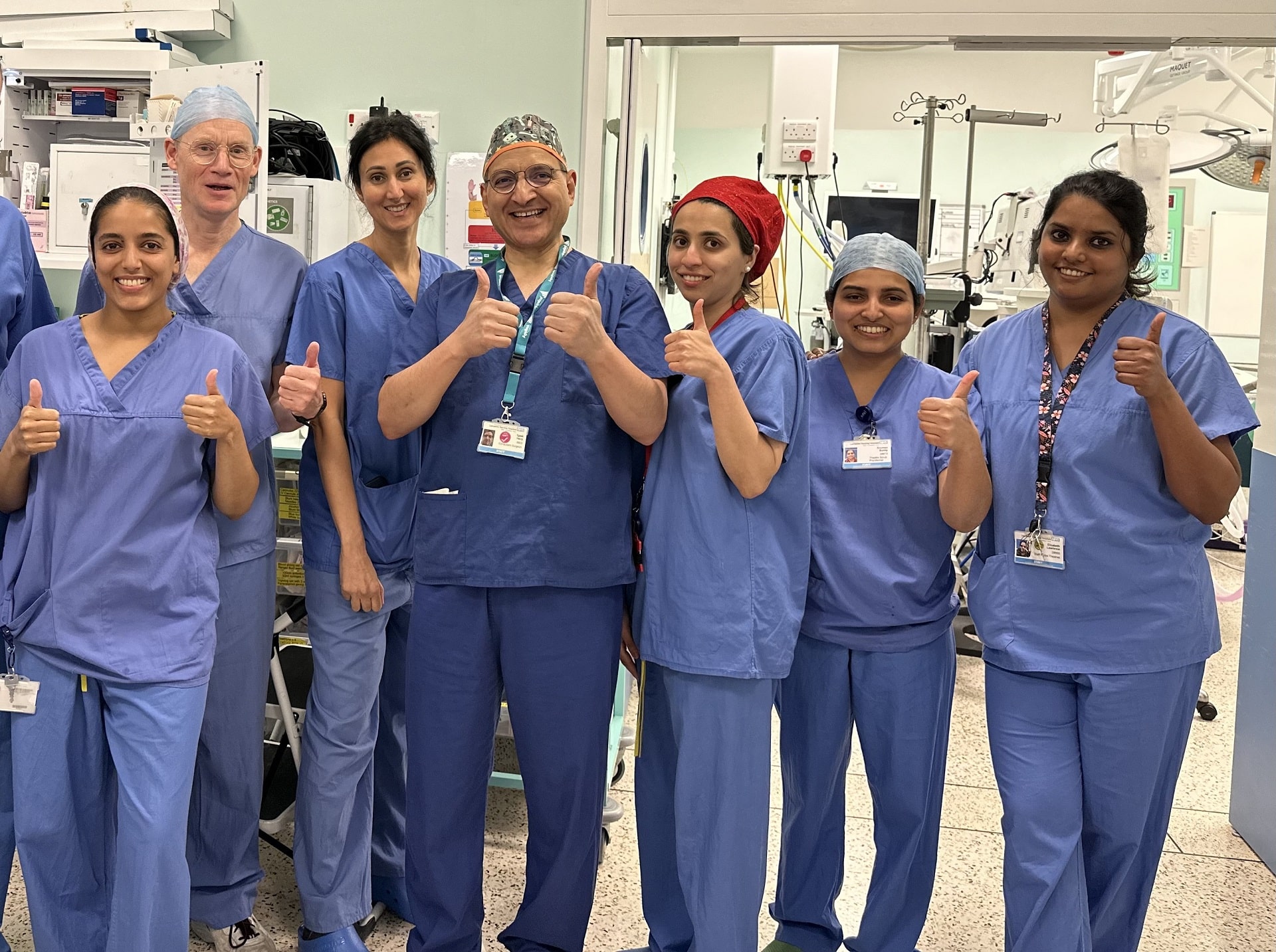
A global-first operation, performed for the last five years exclusively by three Lancashire Teaching Hospitals surgeons, has celebrated a key milestone.
Consultant colorectal surgeons Tarek Hany, Alka Jadav and Arnab Bhowmick performed the 100th case of extra-peritoneal colorectal surgery (EXPERTS) – a novel operation “designed and performed with a view of the future in mind”.
To demonstrate the procedure, the surgeons use a combination of 3D animation and Virtual Reality simulation developed at the Trust. The unique method avoids puncturing the peritoneum, which surrounds the abdominal organs, going underneath the bowel, directly to the area of importance. This helps avoid awkward patient position on the operating table and avoids injuries to other organs.
The procedure is performed with the patient in the supine position, face up, as opposed to the head down position where the feet are raised higher than the head, and there is growing evidence that it is more effective than standard keyhole surgery.
There is low risk of compartment syndrome - an increase in the pressure inside the leg muscles, from the legs being above the heart for a prolonged period – There is also reduced pressure within the lungs and eyes and reduced shoulder injury as is potentially the case with standard keyhole surgery in which patients has to be tilted in the head down position.
Extra-peritoneal colorectal surgery has been presented to learned national and international societies as a world first and has been widely published in scientific literature.
Mr Hany said: “This operation was designed and performed with a view of the future in mind - we believe it is good for the patients, surgeons, Trust, and NHS.
“We have presented the data from 101 cases now, and compared it to the standard surgery, we have found that there is a significantly shorter time for the return of bowel functions, a significant reduction in length of hospital stay, reduced incidence of ileus (a lack of movement in the intestines that leads to a build-up and potential blockage of food material), no occurrences of significant intraperitoneal or retroperitoneal injuries, and lower rates of conversion to open surgery.”
Roy Ballestero, who lives in Preston after spending most of his life in Gibraltar, had the procedure done after being diagnosed with rectal cancer, and admits “it has given me a new lease of life!”
Roy said: “When you are diagnosed with cancer, it can feel like the end of the world, but I’m still here! I’m extremely happy and grateful.
“I was a little apprehensive, but everything was explained to me about what to expect. Everyone agreed using the robotic arm for the surgery was the best option, and everything is so precise. The surgery was a success, and the care post-operation has been excellent, so I’m very happy with how it all went.”
The majority of Mr Hany’s work involved minimally invasive surgery with established robotic colorectal surgery before the EXPERTS technique was developed.
The journey started with a number of cadaveric experiences in 2018 to prove the concept of this unique approach.
Following an extensive procedure implementation process, the first case was performed in February 2020, with the 100th in June this year.
The procedure recently won best oral abstract at the Portsmouth colorectal congress and was presented as an oral presentation at European Society of Coloproctology (ESCP) in Thessaloniki, Greece last week.
How did the idea for the technique come about? Mr Hany explained: “You get an idea, you visualise as much as you can then with some help and great teamwork from my colleagues Alka and Arnie and the Trust, you get to try it on cadavers within our ethical and regulatory frame then boom... it works!
“The peritoneum is like a balloon that surrounds the gut, and most surgeons puncture it, but this idea was to stay outside it, and we kept looking at how we could do that. I’m aware it was mentioned by a surgeon in London in 1996, but it wasn’t taken forward.
“Surgeons often struggle doing the operation the traditional way - going through the peritoneum is not the best especially in high-risk patients, and the patient’s head is lowered so anaesthetists virtually kneel on the floor, so it is awkward. This operation resolves that problem because the patient is flat on the table.”
Mr Hany said the team is eager to develop the technique further moving forward: “I am very grateful of the support we had from the Trust from the beginning of this journey. This is just the beginning, there are further innovative projects on the back of this. The next step is to get a new robotic platform to make the operation even more rewarding for our patients’ outcomes, but that costs money.
“A single port robotic platform or would make this procedure mainstream, or at least best for high-risk surgical patients. We are looking for funds to support this world-first initiative.”







